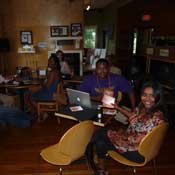Jackson residents are trying to bring a Neshoba County Fair-style festival to Jackson this month in hopes of circumventing piecemeal, sound-bite political coverage of upcoming races.
Former NAACP Jackson President Gus McCoy and other politicos are putting together the June 25 event, Politix in the Park, at Koinonia Coffee House. Event organizers, who are inviting all candidates running in state and local offices, say the city of Jackson needs an event like this to get around what they consider to be incomplete coverage offered though the Internet, television and newspapers.
"The political climate we have right now comes from a sound-bite society," McCoy said. "Instead of hearing political candidates in little pockets, we want to bring people out where they can actually see who's running for office."
Participating candidates will each have a booth or table in the Koinonia parking lot, and can mingle with visitors and sell their political platform to voters. All participating candidates, however, must be ready to expect a volley of questions from voters, reporters and local leaders regarding the lurid details of that platform.
McCoy praised the public format of the famous Neshoba County Fair, but complained that no forum like that exists in the central part of the state or in Jackson. The Neshoba fair is recognized as a place for soapbox presentations to the public, but it also contains a fair amount of hand-shaking and individual meet-and-greet sessions that could make or break a candidacy. Former Republican presidential candidate Ronald Reagan garnered a large following in 1980 when he publicly professed his support for states' rights--a code phrase for opposing federally imposed civil-rights law.
While voting should be about voter responsibility, McCoy said, the Neshoba County format gets the job done when it comes to putting a candidate to the people.
"Think of how many times people go the ballot box, and they don't know who they're voting for. In one particular race, we've got two candidates with the same last name," McCoy said. "The fact of the matter is people will be more apt to vote responsibly when they're informed."
Marvin Williams, an instructional assistant professor of journalism at the University of Mississippi, said modern media no longer have the captured audience it did 30 years ago, when a handful of night-time news shows shelled out a solid hour of deeply researched material. These days, he said, nobody's home to see it, and rarely do viewers have the desire for it, instead culling what news they want from the Internet during their work-day.
"We used to have three- or two-minute packages of news. Now you're lucky if you get a minute to tell the story. If you want to see an in-depth piece you have to wait to see '60 Minutes' or 'CBS Sunday Morning'," Williams said. "On radio, it's even worse. You get maybe a 10-second sound bite, because you've got to fit it in between sponsorships and traffic news. And the audience has come to expect that. Everybody is running little (news) crawls across the bottom of the screen on your TV in the morning."
The Internet has no shortage of information. Websites can deliver not only an audio of the president's most recent State of the Union Address, but also opposing reactions to the speech, and an in-depth analysis and fact-check of the talking points. However, Williams said, readers tend to indulge their short attention spans by reading only the first few tidbits of information before moving on, with precious little data gathered on most topics.
"We're used to getting things so quick that you, as a reporter, now have to be able to boil down the essence of a story in five or 10 words, because nobody's going to read more than two or three graphs at best. And then, before you know it, they've started clicking the mouse again and have gone through several more story links," Williams said.
Both McCoy and Williams say an uninformed voter is in the dark, ultimately, due to his or her own personal preferences, but McCoy says there's only so much information a reporter can truly deliver on a candidate, and that nothing beats a one-on-one conversation to convey a candidate's character and abilities.
"Sometimes you just vote R or D; you vote where your interests are, and that's fine," McCoy said. "But people need to know who they're voting for, and that's what we're trying to deliver."
Koinonia Coffee House is located at 136 S. Adams St., off the Jackson Metro Parkway, between Jackson State University and Downtown Jackson.
Previous Comments
- ID
- 163785
- Comment
I think this is a great idea. I want to attend such an event because I do have lots of questions to ask.
- Author
- golden eagle
- Date
- 2011-06-08T21:56:38-06:00



Comments
Use the comment form below to begin a discussion about this content.
comments powered by Disqus